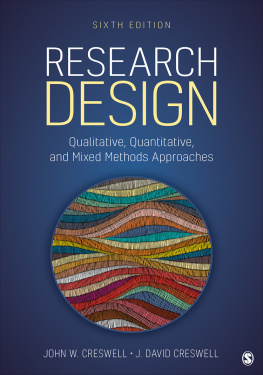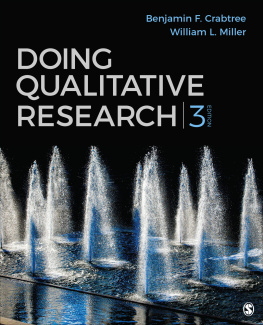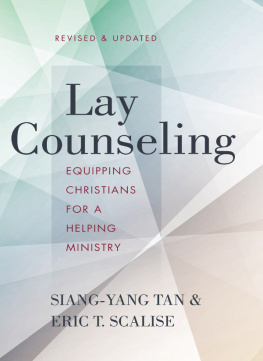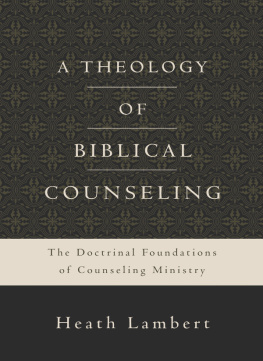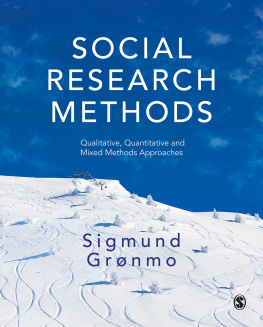COUNSELING RESEARCH
QUANTITATIVE, QUALITATIVE, AND MIXED METHODS
Carl J. Sheperis
Walden University
J. Scott Young
University of North Carolina at Greensboro
M. Harry Daniels
University of Florida

Vice President and Editor in Chief: Jeffery W. Johnston
Acquisitions Editor: Meredith D. Fossel
Editorial Assistant: Nancy Holstein
Vice President, Director of Marketing and Sales Strategies: Emily Williams Knight
Vice President, Director of Marketing: Quinn Perkson
Marketing Manager: Amanda L. Stedke
Senior Managing Editor: Pamela D. Bennett
Senior Project Manager: Mary M. Irvin
Senior Operations Supervisor: Matt Ottenweller
Senior Art Director: Diane Lorenzo
Cover Designer: Diane Ernsberger
Cover Art: SuperStock
Full-Service Project Management: S4Carlisle Publishing Services, Ashley Schneider
Composition: S4Carlisle Publishing Services
Printer/Binder: Hamilton Printing Co.
Cover Printer: Phoenix Color Corp.
Text Font: Times New Roman
Credits and acknowledgments borrowed from other sources and reproduced, with permission, in this textbook appear on appropriate page within text.
Every effort has been made to provide accurate and current Internet information in this book. However, the Internet and information posted on it are constantly changing, so it is inevitable that some of the Internet addresses listed in this textbook will change.
Copyright 2010 Pearson Education, Inc., Upper Saddle River, New Jersey 07458. All rights reserved. Manufactured in the United States of America. This publication is protected by Copyright, and permission should be obtained from the publisher prior to any prohibited reproduction, storage in a retrieval system, or transmission in any form or by any means, electronic, mechanical, photocopying, recording, or likewise. To obtain permission(s) to use material from this work, please submit a written request to Pearson Education, Inc., Permissions Department, 501 Boylston Street, Suite 900, Boston, MA, 02116.
Library of Congress Cataloging-in-Publication Data
Sheperis, Carl.
Counseling research: quantitative, qualitative, and mixed methods/
Carl J. Sheperis, J. Scott Young, M. Harry Daniels.1st ed.
p. cm.
Includes bibliographical references and index.
ISBN 978-0-13-175728-8
1. CounselingResearch.
I. Young, J. Scott. II. Daniels, M. Harry. III. Title.
BF636.6.S54 2010
158'.3072dc22
2009017024
10 09 08 07 06 05 04 03 02 01

| ISBN 10: 0-13-175728-8
ISBN 13: 978-0-13-175728-8 |
To Donna for your undying support in every phase of this project and every phase of our lives.
Carl J. Sheperis
Dedicated to the memory of Dr. Nicholas A. Vacc, who inspired both excellence and innovation in the practice of research.
J. Scott Young
For my wife and daughters - Diane, Gretchen, and Erin
Harry Daniels
PREFACE
As a counselor-in-training, you might regard the research aspect of your program of study as a strange bedfellow for your clinical training. Of course, your preliminary interests (depending upon your emphasis area) are to learn how to develop peer-mediation programs for a school district, learn how to address the symptoms of mental illness, understand the various implications for a disability on an individuals vocational future, or learn how to address roommate relational issues through residence-hall programming. Because you want to learn the essential skill sets to become an effective counselor, it is probably difficult to see how research fits into your academic plan. As you read through the chapters of this book, we hope it becomes clear that research and counseling are integrally intertwined, and that you need research to help you maintain best practices in the world of counseling.
Our goal, through this text, is to help you integrate research into the process of building your counseling skills. Through this text, you will be exposed to the foundational principles of research and how they apply to the counseling profession. We will guide you through the various aspects of counseling research and expose you to quantitative, qualitative, and mixed-methods approaches.
APPROACH AND ORGANIZATION OF THE BOOK
This book was designed as an introductory research text for counselors-in-training and assumes no prior knowledge. We undertook this project due to our concern that there are few text options for counselor educators who teach research to masters-level counseling students. It was our desire to create a book that is geared toward the issues counselors face when conducting research and that it be presented in a direct, easy-to-read manner using counseling literature and examples to communicate the information the typical masters-level counselor needs to know. In short, we wanted to write a student-friendly book that we wish we had had when we were taking our research courses.
This book is arranged into 18 chapters and 2 appendices. In Part 1, we lead the reader through the steps a researcher takes to begin a studyincluding reviewing the literature, developing research ideas and appropriate research questions, and deciding on a methodology that best suits an investigation of the topic. In Part 2, we explore quantitative approaches to research methodology, followed in Part 3 by a discussion of qualitative approaches to research. Part 4 covers mixed-method designs, data analysis, and writing up ones findings into a research manuscript. The book closes with a discussion of multicultural counseling issues in research.
We begin each chapter with Learning Objectives for the content, with the hope that these objectives will assist readers in focusing their study to critical areas. Similarly, each chapter ends with a set of review and discussion questions designed to provide a summation of important content and its application. In the main body of the chapters, we provide many examples drawn from the counseling literature to give the reader a real-world context for the material discussed. All chapters are written with the overall intention that a reader will finish the book knowing how to execute a research project from beginning to end. Furthermore, and perhaps most important, demystifying the research process is a central purpose of this book. It is our desire that masters-level counselors become both consumers and producers of counseling research with the belief that, yes, I can do this!
ANCILLARIES
Ancillaries for this textbook:
Instructors Manual: This manual is constructed to provide the research professor with instructional aids for each chapter, including: chapter overview; outlines (talking points); keywords and definitions; suggested learning activities; and a test bank.
PowerPoint Lecture Slides: Instructors are provided with a bank of lecture slides that detail the essential elements of each chapter in the textbook.


